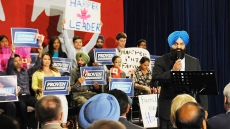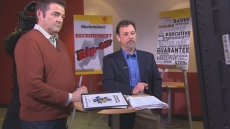OTTAWA — Sen. Mike Duffy says he resisted "at every opportunity" a scenario laid out for him by the former Prime Minister's Office to tell the public he had made a mistake and was repaying his Senate expenses.
Five days into the former Conservative senator's testimony, defence lawyer Donald Bayne has arrived at the most politically charged issue of the trial — the $90,000 payment.
Nigel Wright, the one-time chief of staff to former prime minister Stephen Harper, secretly repaid Duffy's contested Senate expenses in March 2013.
The negotiations between the PMO, Duffy and his lawyer over the repayment have formed the basis of the bribery charge that the senator faces. Duffy has pleaded not guilty to 31 charges of fraud, breach of trust and bribery.
The key question for the judge to consider is whether Duffy was coerced into going along with a scheme concocted by powerful political operatives, or whether he was a participant in setting the parameters for repayment.
As Bayne went through emails between PMO staffers in February 2013, Duffy said he was unaware at the time they were discussing a scenario where he would say he had made a mistake with his expenses and commit to repay them.
"Again, to be clear, was the scenario yours?" Bayne asked.
"Not mine, didn't contain my views of what had gone on. It was completely at odds, 180 degrees from what I believed," Duffy said.
Duffy has maintained that he did not break any rules when he claimed living and travel expenses based on the premise that his primary residence was in Prince Edward Island.
In his testimony in August, Wright told the court that he put pressure on Duffy to acquiesce and say he was repaying his expenses. But he also detailed how Duffy, through his lawyer, placed conditions upon him doing so during negotiations, including ensuring Duffy was never out of pocket.
Earlier in the day, Bayne finished reviewing a series of Senate contracts with Duffy that also triggered criminal charges. Duffy arranged for former broadcast colleague Gerry Donohue to receive $65,000 in contracts, and Donohue in turn paid out tens of thousands to other service providers on Duffy's direction.
According to Duffy, he needed help deciphering what his own government was doing and getting traction for his policy ideas.
In one case, Duffy organized a consulting contract for a former Prince Edward Island political operative, Peter McQuaid. He said McQuaid would help give him "ammo" for the weekly Conservative caucus meetings.
Duffy was particularly worried about safeguarding the equalization system for Prince Edward Island.
"I needed someone who knows what arguments worked for the federal government in the past and how can I argue with the current government that the status quo must at least be maintained," Duffy said.
Duffy said that Donohue, a former labour executive for a broadcast technicians union, would also give him advice on how to raise issues successfully with Harper.
"How do I go and tell the boss that he's wrong? As a professional negotiator, Mr. Donohue advised me on that," Duffy said.
Both McQuaid and Donohue provided verbal advice to the senator.
A third figure, former Parliament Hill journalist and ministerial aide Bill Rodgers, was paid to help Duffy sort out what the government was really doing on certain policies, versus what ministers said during caucus meetings.
"After a while, it became apparent that there was a disconnect between what was being said in that room and what was going on in the real world," Duffy told the court.
Rodgers, also known as William Kittelberg, would tell Duffy what was "real" and what was "political spin" from the Conservative cabinet.
"That allowed me to understand better the public policy landscape in which we were operating and to know when I spoke to people whether I was reading them back talking points that were incomplete or, in fact, false," Duffy said.
Bayne has emphasized that Duffy received no kickbacks for any of his contracts and that they were all transparently submitted to the Senate as legitimate public business. The argument is that while they were paid out in an unorthodox way, they were not criminal.





